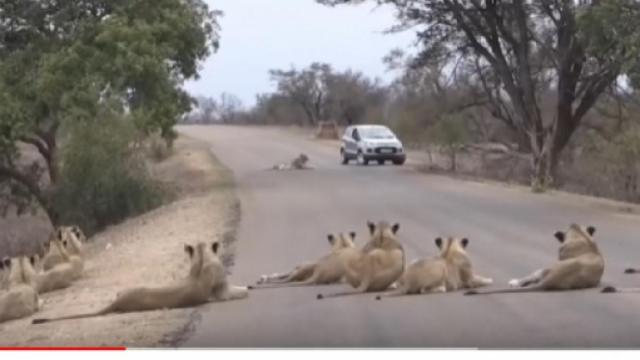Coronavirus, the disease that originated in China, has put the fear of God into humans. However, it has come as a blessing in disguise for the wildlife in the Kruger national park. This vast expanse of land is home to a large variety of wildlife and, the absence of humans has encouraged them to let down their hair literally. This is especially true for lions who are seen on the road in a relaxed mood. These big cats and other animals are taking advantage of the peace in the park as South Africa remains under strict lockdown. The animals are trying to make the most of the open spaces and freedom minus the interference of humans.
Lions nap on road during lockdown at South Africa's Kruger National Park https://t.co/oO99LDhuax
— BBC News (World) (@BBCWorld) April 16, 2020
The Guardian says one of the park rangers captured photographs of a pride of lions with their young ones outside a rest lodge in the park. The animals appeared to be snoozing on the tarmac. It was a rare sight, and an official of the Kruger national park admitted to a section of the media that it is reasonable to find the lions in the bushes, and this was an exception. They were on the road because it was dry. He added - they were “very smart, and now they are enjoying the freedom of the park without us.”
Other wildlife in the Kruger park
Coronavirus is a contagious disease, and it has forced humans on the back foot.
People have forgotten the concept of life on the fast track, and roads are empty, flights are grounded, cruise ships are stranded in the seas, and employees are working from home. They are trying to master the art of social distancing because physical contact like a handshake is now taboo. The net result of coronavirus is good for the environment but not a happy one for humans.
The environment is getting a new lease of life and a chance to recover from the damages inflicted on it by humans.
A lineup of lazy lions took a load off on a quiet road in South Africa.
— New York Daily News (@NYDailyNews) April 16, 2020
Kruger National Park said the crew of big cats typically steers clear of the road and away from the drumbeat of tourists.https://t.co/5QLYejbFQt
The Guardian mentions a social media post of the park that explains that the pride of lions in the photograph are not from areas that are open to tourists.
Earlier in the week, a member of a golf club inside the premises of the park was fortunate enough to capture early-morning videos and images of animals like lions and hyenas in their natural surroundings. Before that, there were wild dogs. Anyway, the threat of poachers continues. It seems they were active and had their sights on rhinos in tourist hotspots. They killed nine of them between the start of the lockdown on 23 March and 8 April. However, just before the lockdown came into effect, the authorities had arrested four suspected rhino poachers.
Absence of humans from the Kruger park encourages wildlife
According to The BBC, animals in the park in South Africa are taking advantage of the situation created by a coronavirus that has forced humans to remain indoors.
One ranger of the park snapped the photograph of a pride of lions sleeping on a road. The age of the oldest lioness in the vanity was about 14. This road is usually busy with tourists, but there are no tourists because of lockdown due to fears of coronavirus infection. Usually, lions are visible in the streets only at night. In the opinion of the ranger, there has been hardly any effect of the lockdown on the behavior of animals. South Africa has recorded some deaths of people with COVID-19, and there are many cases of infection, making it the most affected country in Africa.
The Kruger national park is a travel destination
The sprawling open spaces of the park in South Africa are a major Travel destination.
There are tours arranged by tour operators, and the more adventurous ones can undertake the safaris of the Kruger National Park on their own. There are similar parks in other countries where tourists arrive in large numbers to see wildlife in their natural surroundings. One can see lions, rhinos, elephants, and tigers in the zoos, but watching them from close quarters is an experience many love to cherish.
![Pride of lions in Kruger National Park South Africa. [Image source/Dayneferrera, Wikimedia Commons] Pride of lions in Kruger National Park South Africa. [Image source/Dayneferrera, Wikimedia Commons]](https://staticr1.blastingcdn.com/media/photogallery/2020/4/17/660x290/b_502x220x82/pride-of-lions-in-kruger-national-park-south-africa-image-sourcedayneferrera-wikimedia-commons_2443779.jpg)



